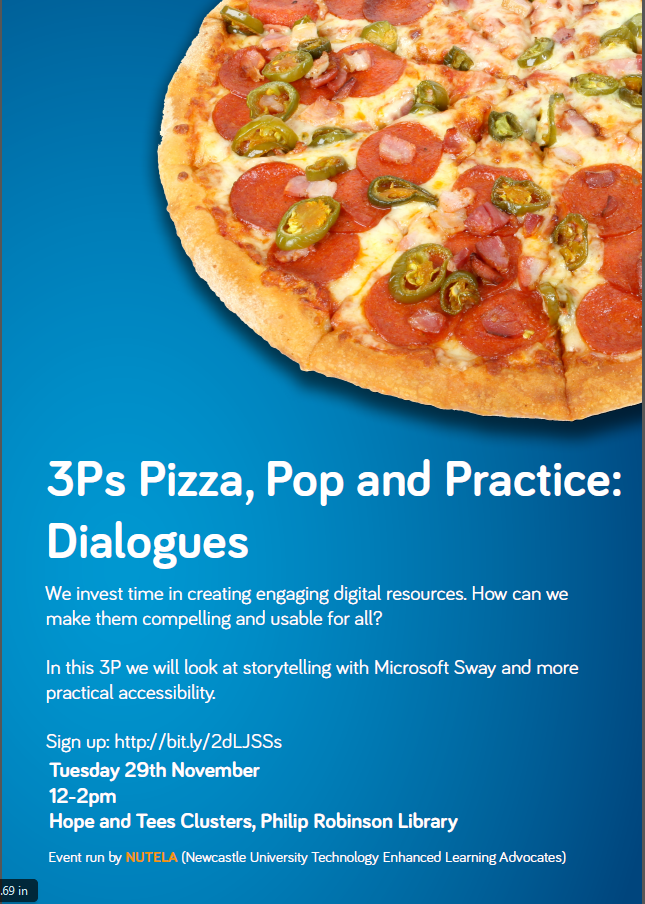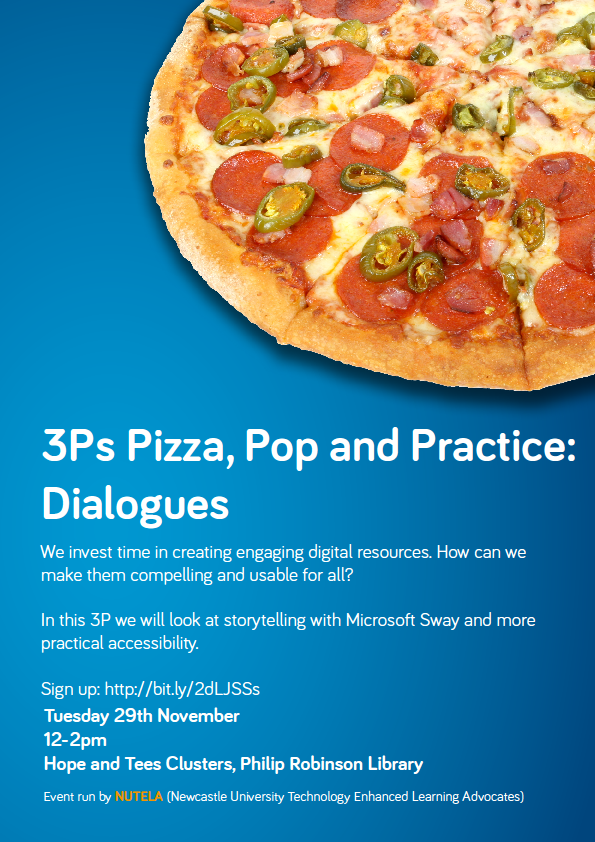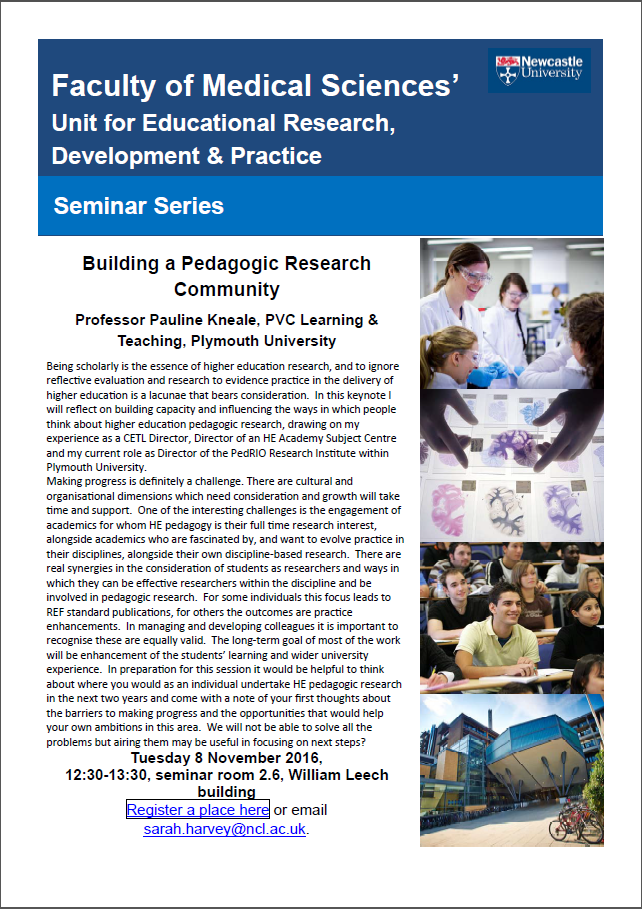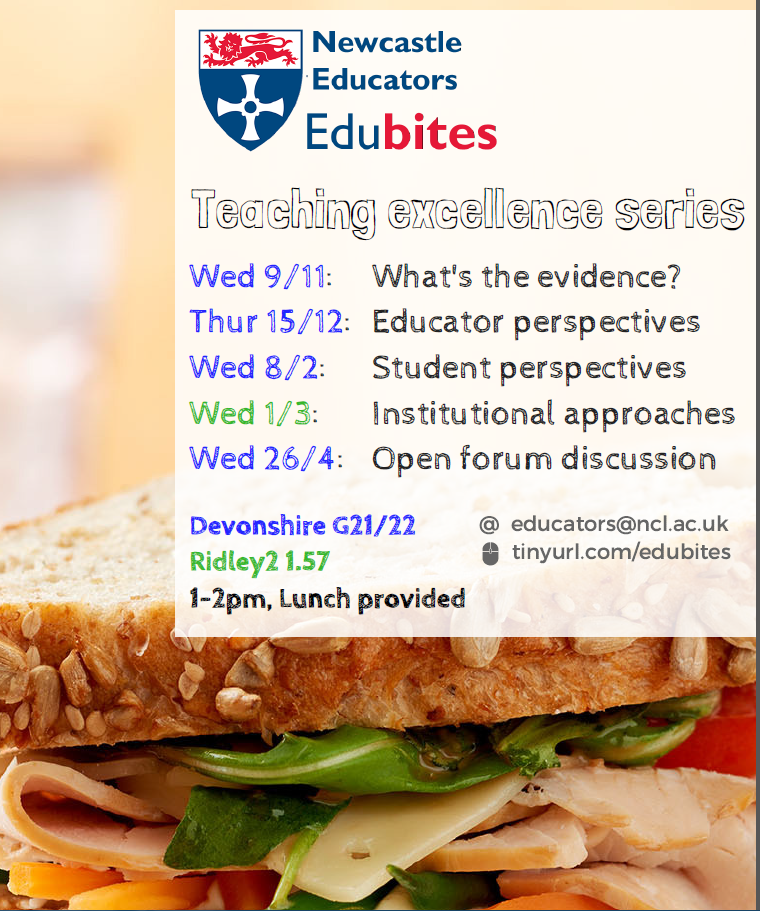NUTELA 3Ps: Dialogues
The next 3Ps: Pizza Pop and Practice workshop will take place on 29th November 2016.
 The topic is ‘Dialogues’ and draws together sessions on storytelling using Microsoft Sway and the complexities of designing materials accessible to all students.
The topic is ‘Dialogues’ and draws together sessions on storytelling using Microsoft Sway and the complexities of designing materials accessible to all students.
The event will take place between 12 and 2pm in the Hope and Tees Clusters of the Robinson Library.
There will, of course, be pizza and pop available before the workshops begin.
Please do register here.
We look forward to seeing you there!
3Ps: Dialogues
The next 3Ps: Pizza Pop and Practice workshop will take place on 29th November 2016.

The topic is ‘Dialogues’ and draws together sessions on storytelling using Microsoft Sway and the complexities of designing materials accessible to all students.
The event will take place between 12 and 2pm in the Hope and Tees Clusters of the Robinson Library.
There will, of course, be pizza and pop available before the workshops begin.
Please do register here.
We look forward to seeing you there!
Why build the Wall?
At the end of week one of Hadrian’s Wall: Life on the Roman Frontier we have been asking “Why was the Wall built?”
If you would like to find some of the diverse views on this topic you can watch this extra discussion that Professor Ian Haynes held with world experts on Hadrian’s Wall.
In this 13 minute film, recorded in 2014, you will see Ian talking with:
- Professor David Breeze (Visiting Professor, Newcastle University),
- Dr Sue Stallibrass (Historic England, Regional Science Advisor, NW England
- Dr Nick Hodgson (Principal Keeper of Archaeology: Strategic Project Management, Tyne & Wear Archives and Museums)
Have their ideas changed your own thoughts at all?
ULTSEC Innovation Fund Dates Announced
The submission dates for ULTSEC Innovation Fund have been announced for 2016/17.
Responsive
Autumn – Monday 7th November 2016
Spring – Monday 10th April 2017
Summer – Friday 26th May 2017
Strategic
Semester 1 – Friday 20th January 2017
Semester 2 – Friday 26th May 2017
We will be running some webinars and workshops which will be available to book on to via the ULTSEC Innovation Fund webpage shortly.
There will also be training workshops giving useful advice on preparing submissions. Please see our website for details.
Three Rivers Learning and Teaching Conference 2016
The next annual North East Regional Three Rivers Learning and Teaching Conference will be held on the 17 March 2017 at Teesside University.
 Now in its 10th year, this regional conference builds upon the success of previous partnership events held by the region’s Universities (Northumbria, Sunderland, Durham, Newcastle and Teesside). The conference title is ‘Transformations, Transitions & Territories’ and further information can be found on our website.
Now in its 10th year, this regional conference builds upon the success of previous partnership events held by the region’s Universities (Northumbria, Sunderland, Durham, Newcastle and Teesside). The conference title is ‘Transformations, Transitions & Territories’ and further information can be found on our website.
We would like you to participate in this year’s conference by submitting an abstract for a 20 minute paper presentation by 16th December 2016 that is focused on one of the following areas of the student journey:
- Transforming assessment
- Embedding employability
- Student access, retention, attainment and progression in higher education
- Internationalising higher education
- Flexible learning
- Student engagement through partnership
- Technology enhanced learning
- Education for Sustainable Development
Submissions are welcome from all staff at participating institutions and joint student/staff submissions are encouraged.
Please read the supporting information before writing your abstract.
Please submit abstracts by 16th December 2016.
Proposers will be informed of the outcome of the selection process in January 2017.
Conference bookings will open in the New year. Please see our the Three Rivers website for more information
For further information, please contact Rosa Spencer in Newcastle’s SDU or Richard Sober at Teesside.
International Student Barometer 2016
Monday 24 October sees the launch of the 2016 International Student Barometer (ISB), which Newcastle is taking part in for the eleventh time.
The ISB gives European Union and international students the opportunity to give their opinions on their experiences at Newcastle, from arrival at the University, through to teaching, accommodation and employability
We will survey all full-time and part-time EU and international undergraduates, taught and research postgraduate students, as well as study abroad and exchange students, based here in Newcastle and at Newcastle University London. We are unable to survey non-UK based and distance learning students as part of the ISB.
What is the ISB?
The annual ISB, which is run by i-Graduate, asks European Union and international students in around 200 universities across the world about their course and learning experiences. In 2016, the ISB will run at Newcastle between 24 October and 2 December.
What questions does it ask?
The survey includes questions about the whole student learning experience, including:
- Pre-Arrival (including decision-making, application, and funding)
- Arrival (including registration, and welcome/induction)
- Learning (including teaching, assessment, and employability)
- Living (including living costs, sports facilities, and accommodation)
- Support (including personal tutors, students’ union, and wellbeing)
Who benefits from the ISB?
Schools, professional support services and NUSU examine the anonymised ISB data internally to identify areas of strengths and weaknesses. This information can be used to help effect changes designed to enhance or improve the student experience for both current and prospective students.
Some examples of changes implemented in recent years can be found at https://internal.ncl.ac.uk/yousaidwedid/actions/
Want to know more?
More details about the ISB, including access to previous year’s results, can be on the University website or obtained by emailing the team.
ERDP Workshop
The ERDP (Unit for Educational Research, Development and Practice) will welcome Pauline Kneale PVC(T) Plymouth University for as part of their seminar series next month.
Pauline has led the development within Plymouth of a very active and successful Pedagogic Research network.
She will be leading a workshop in the morning of 8 November on evaluating teaching development which will be based upon the findings of an HEA-funded project.
She will also be delivering a seminar at lunchtime on that day, in which she will be sharing her reflections on developing pedagogic research.
 Pauline is an excellent speaker and her presentations will be of interest to anybody interested in developing pedagogic research whatever stage their career is at or is interested in evaluating the impact of their teaching.
Pauline is an excellent speaker and her presentations will be of interest to anybody interested in developing pedagogic research whatever stage their career is at or is interested in evaluating the impact of their teaching.
If you wish to attend this event please register.
This information, as well as details of other upcoming ERDP events, is also available at on the FMS website.
Edubites by Newcastle Educators – 2016 Programme of Events
 With increasing developments and discussions around teaching excellence in the sector, the Edubites sessions this year will be delivered as a Teaching Excellence Series to discuss this topic from a range of perspectives.
With increasing developments and discussions around teaching excellence in the sector, the Edubites sessions this year will be delivered as a Teaching Excellence Series to discuss this topic from a range of perspectives.
Everyone is invited and welcome to attend as many of the sessions as they wish.
As always, Edubites offers you the opportunity to share your practice and discuss issues or points of interest with other colleagues, so please do come prepared to contribute.
Lunch will be provided, so please register if you wish to attend.
Meet The Archaeologist: an interview with Prof Ian Haynes
Each year we open up Hadrian’s Wall: Life on the Roman Frontier to thousands of new learners.
While we know Prof Ian Haynes as the architect and lead Educator of Hadrian’s Wall, this is only a small facet of his life as an archaeologist!
Ian spoke to Archaeosoup Productions as part of their “Meet the Archaeologist” series – you can find out more about Ian’s interests and projects from this YouTube video:
Ian has made much of his scholarly work available on academia.edu – this can be accessed by creating a free account.
View Ian’s papers on Academia.edu
Find out about the next scheduled dates for Hadrian’s Wall: Life on the Roman Frontier


